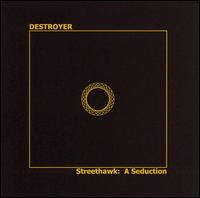
Destroyer
Streethawk: A Seduction
(Misra; 2001)
By Chet Betz | 1 September 2005
Reviews of any early Mercury Rev albums would be neato. Or maybe even pre-“This Night” Destroyer albums; this site (and the New Pornographers) got me into Destroyer, and I think exposing people to earlier albums would be a good thing.
Yeah.
...Thanks?
-Wyatt Miller
“There’s something terrifically uplifting about that which emanates a wistful, hopeful positive ion charge of all rhyme, no reason. Streethawk: A Seduction should be the hold music for suicide hotlines.” – Me, from Cokemachineglow’s Top 60 Albums of the ’00s, So Far
I quote myself because Destroyer’s Streethawk is an opacity that also inspires instant enjoyment and involvement, and so it leaves its listeners with an endless list of thoughts and feelings about their thoughts and feelings when they listen to it, nothing have much to do with Bejar’s thoughts or feelings, those being mostly inscrutable beyond the reaction they inspire. It’s a lot like a Pavement album in that one finds one’s self incredibly moved by and enamored with what they’re hearing, and the why’s come down to little more than “this is music to be moved by and enamored with.” It’s the monolithic man of the hour on E, and all who crowd about can appreciate the brain before them, they can tell its faculties are considerable, just as much as they can tell that they are currently appreciating those faculties in a warped, fucked, grinning, finger-swimming state. Consider the changing chorus to “Farrar, Straus & Giroux (Sea of Tears),” with its pivotal lines being “No man has ever hung from the rafters of a second home,” and “No man has ever hung at the temporary age of 24.” There’s no sign of obfuscation at work here; it’s as indomitable a charm of superficial, intellectual character as Peter Sellers’ Quilty.
One might expect Bejar, then, to sing these songs in a Turkish bath robe, his strumming pick fingers connected about the stem of a martini glass, but something’s so earnest about the entertainment at hand, and the music can’t hide its considered, witty togetherness behind a casual smirk. No, not much sloppy about the way the guitar dribbles off Jason Zumpano’s “English Music” down chord, nor with what perfect timing J.Z. switches up his piano playing for the song’s fade-out.
The seven minutes of “The Bad Arts” are pretty much all that Destroyer is, most definitely all that Streethawk is, a lot of other things, too, and certainly the album’s paramount “seduction.” In an effort to scribe that reactionary affinity for what Bejar does on this album, I’ll ruffle through the song’s sundry, shiny pieces, each one connected in a way that makes little sense yet feels preternaturally right.
An initially faceless acoustic strum reveals its melody after a bit of stalling, Bejar begging some existential “horizontal myth” for absolution before creakily addressing the person he’s with (gotta be a girl): “Goddamn your eyes / They just had to be twin prizes waiting for the sun.” A pause, the bass and drums dollop in, the song’s completely different, no one knows what the hell’s going on, but Bejar sings, “Why did you spend the ’90s cowering? / Why did you spend the ’90s cowering?” That one repetition is enough of a foothold to start climbing with this new movement, up the absurd rock face, and guitars return for, “And the hotels of choice are now toasting your voice / As the spas ring out, ‘What’s another word for sacrament?’” Since the guitars came back, those lines were probably supposed to be special; same for Bejar jibbering about “taking notes for a crooked underground,” since that’s followed by a guitar solo of the song’s melodic reprise, which is in turn followed by the even more special lines, “The world woke up one day to proclaim / ‘Thou shalt not make, or take part, in the bad arts,’” more special because the song’s title is in there, right. Then Bejar gets rowdy with “Bloodlet yourself, street style!,” he and his music cut out like a toppled amp, immediately the synths chime in, there’s that shifty melody now embellished in a piano progression, and suddenly angel Bejar’s voice reverberates down from the clouds, “You got the spirit / Don’t lose the feeling,” over and over and over.
As far as I can tell, the song’s about the constant liminality of human existence, nudged along by the eddying yet reassuring flow of time, how this fact is the basis of life and the artistic process, and how it’s just as important to have joy in the process as it is to have some holy principle that sparks the process. And it’s about all these things as incoherently and gleefully and smartly as possible.
The remainder of Streethawk: A Seduction is just more of the same.





